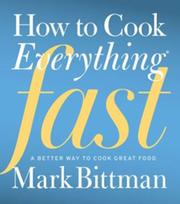 For those who crave home cooking but have minimal time to spend in the kitchen, food writer Mark Bittman--a New York Times columnist and Today Show regular--has the solution. How to Cook Everything Fast: A Better Way to Cook Great Food is packed with 2,000 recipes plus tips and strategies for swiftly making delicious dishes like Cucumber and Salmon Salad with Caper and Mustard Dressing; revamped classics like Spaghetti and Drop Meatballs with Tomato Sauce; and globally inspired fare like Potato and Spinach Saag.
For those who crave home cooking but have minimal time to spend in the kitchen, food writer Mark Bittman--a New York Times columnist and Today Show regular--has the solution. How to Cook Everything Fast: A Better Way to Cook Great Food is packed with 2,000 recipes plus tips and strategies for swiftly making delicious dishes like Cucumber and Salmon Salad with Caper and Mustard Dressing; revamped classics like Spaghetti and Drop Meatballs with Tomato Sauce; and globally inspired fare like Potato and Spinach Saag.
What inspired the idea to do a fast take on home cooking?
I hear all the time that people simply don't have time to cook. How to Cook Everything Fast addresses that: it makes cooking as efficient, enjoyable and delicious as possible. None of the recipes take more than 45 minutes, and the vast majority take less than 30. Some things that used to take 40 minutes now take 20.
To accomplish that, I had to build a better recipe. I've been writing recipes for 30 years and using them for more than 40, and to this point, nobody--myself included--had published a recipe that captures the efficient rhythms of the kitchen. This book completely reimagines how recipes are written, trading the standard style of mise en place--preparing ingredients before you cook them--for a method that promotes prepping and cooking simultaneously. While the pan is heating, chop an onion; while the onion is sautéing, mince some garlic. Taking advantage of the natural lulls that cooking provides is the only way to truly make the most of your time in the kitchen. This is how I (and most experienced cooks) cook every single day, and I wanted to write recipes to match.

It's not hard to cook something fast: scrambled eggs take maybe three minutes. What is challenging is finding the time in our increasingly jam-packed schedules to cook meals that actually excite us. Even for home cooks who only have 30 minutes to get dinner on the table, pasta with jarred tomato sauce and bagged salad with bottled dressing isn't going to cut it. So, my goal in writing this book wasn't to compile a bunch of recipes that just so happen to be fast, but to show how to cook interesting and delicious food--like Ricotta Dumplings with Spinach and Brown Butter or Stir-Fried Beef with Skillet Kimchi--as well as dishes that are normally "slow"--like roast turkey with stuffing or chicken Parmesan--in less time than ever before. Lucky for us, the key to cooking fast without sacrificing flavor is a skill that anybody who's strapped for time is plenty familiar with: multitasking.
How will both kitchen beginners and experienced cooks benefit from the book?
These recipes do all the thinking for you; they're easier than ever to jump right into and harder than ever to screw up. There's no need to prep anything in advance or even to read through the recipes beforehand. All you have to do is make sure you've got all of the ingredients on hand and start cooking. Not only can beginners just dive in head first, but they can cook truly exciting food--spanning a huge range of techniques and cuisines--right from the start, instead of having to first master the standard-issue recipes--roast chicken, lasagna, omelets, etc.--that are the hallmark of most basic cookbooks.
And the focus on prepping and cooking simultaneously helps new and experienced cooks alike. If you've never cooked before, then you won't have to un-learn the ubiquitous--but totally impractical--recipe convention of mise en place. If you are in the habit of preparing all of your ingredients first, then this book will show you how to take your cooking to the next level by using your time in the kitchen as efficiently as possible. And if you're a veteran who has always multitasked in the kitchen, then there's finally a collection of recipes that captures the way that you actually cook.
What are some of your favorite recipes in How to Cook Everything Fast--including one for dessert, which you say "isn't a luxury but a necessity?"
Fastest Chicken Parmesan is probably my favorite recipe in the whole book. Not only is stacking and broiling chicken and sliced tomatoes way faster than dredging and pan-frying, making tomato sauce and baking, but it's better too because the breadcrumbs stay crunchy and the whole thing tastes incredibly fresh. I've also been kind of hooked on the Broken Wonton Soup. Wonton soup is the kind of comfort food that I want on a weeknight but would never take the time to make all those dumplings. This recipe acknowledges that actually forming the wontons has no bearing on the taste of the soup (plus they fall apart when you eat them anyway). You just make the filling into meatballs and cook the wrappers like noodles. The Skillet Fruit Crisp distills that dish down to its core: tender fruit and crunchy topping. Baking is probably the slowest conceivable way to achieve that result; with two skillets--one for sautéing the fruit and one for the topping--you make it happen in a fraction of the time.
As a self-taught cook, what words of wisdom or advice do you have for home chefs?
Don't let anybody tell you that you're in a "dinner rut." I cook basically the same thing--some combination of grains, vegetables and fish--all week, and I'm totally fine with that. It's not a rut unless you say it is. If you're feeding yourself and your family food that keeps you healthy and makes you happy, then you're doing something majorly right. And if it happens to be repetitive and you're fine with that, so be it.

